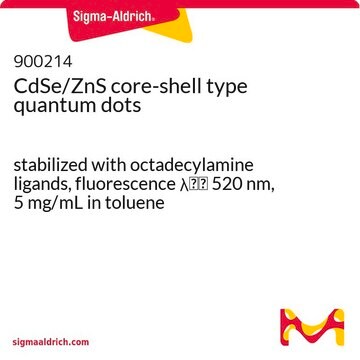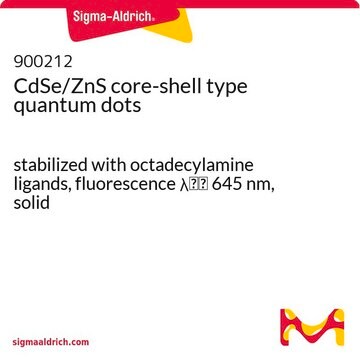748021
CdSe/ZnS core-shell type quantum dots
stabilized with octadecylamine ligands, fluorescence λem 520 nm, solid
Synonym(s):
Artificial atoms, Fluorescent nanocrystals, QDs
About This Item
Recommended Products
form
solid
fluorescence
λem 520 nm
Looking for similar products? Visit Product Comparison Guide
Application
Protocol to make QD solutions (dispersing QDs into solutions):
1. Weigh desired amount of the quantum dot powder and put it in a glass vial;
2. Add desired amount of the solvent, i.e. toluene, chloroform, hexane, etc. (mostly non-polar organic solvents) in the vial and shake the vial;
3. If there is any solid left in the vial after shaking, sonicate the vial for 30~60 seconds to get the quantum dot powder well dispersed. If required dilute the solution further.
Lifetime: three years if stored properly between 4-25°C. Do not freeze.
Protocol to make QD solutions (dispersing QDs into solutions):
1. Weigh desired amount of the quantum dot powder and put it in a glass vial;
2. Add desired amount of the solvent, i.e. toluene, chloroform, hexane, etc. (mostly non-polar organic solvents) in the vial and shake the vial;
3. If there is any solid left in the vial after shaking, sonicate the vial for 30~60 seconds to get the quantum dot powder well dispersed. If required dilute the solution further.
Material has a shelf life of around 3 years if stored properly. Store at room temperature (4-25 °C); do not freeze. Should not be exposed to extreme temperatures.
Legal Information
Signal Word
Danger
Hazard Statements
Precautionary Statements
Hazard Classifications
Acute Tox. 4 Inhalation - Acute Tox. 4 Oral - Aquatic Acute 1 - Aquatic Chronic 1 - Eye Dam. 1 - Skin Irrit. 2 - STOT RE 2 - STOT RE 2 Oral
Target Organs
Kidney,Bone, Liver,Gastrointestinal tract,Immune system
Supplementary Hazards
Storage Class Code
11 - Combustible Solids
WGK
WGK 3
Flash Point(F)
Not applicable
Flash Point(C)
Not applicable
Certificates of Analysis (COA)
Search for Certificates of Analysis (COA) by entering the products Lot/Batch Number. Lot and Batch Numbers can be found on a product’s label following the words ‘Lot’ or ‘Batch’.
Already Own This Product?
Find documentation for the products that you have recently purchased in the Document Library.
Articles
Dye-sensitized solar cells as a promising, low-cost photovoltaic technology.
Professor Xiaohu Gao (University of Washington, USA) provides a overview of recent quantum dot (QD) advancements and their potential for advancing bioassay and bioimaging technologies.
Professor Sharma and colleagues review the synthesis and applications of this novel material. This includes a discussion of the unique properties of quantum dots and their suitability for solar cell applications, along with common synthesis techniques used to develop these materials.
Perovskite quantum dots research progresses overcoming challenges, enabling rapid development of light-emitting devices.
Our team of scientists has experience in all areas of research including Life Science, Material Science, Chemical Synthesis, Chromatography, Analytical and many others.
Contact Technical Service







